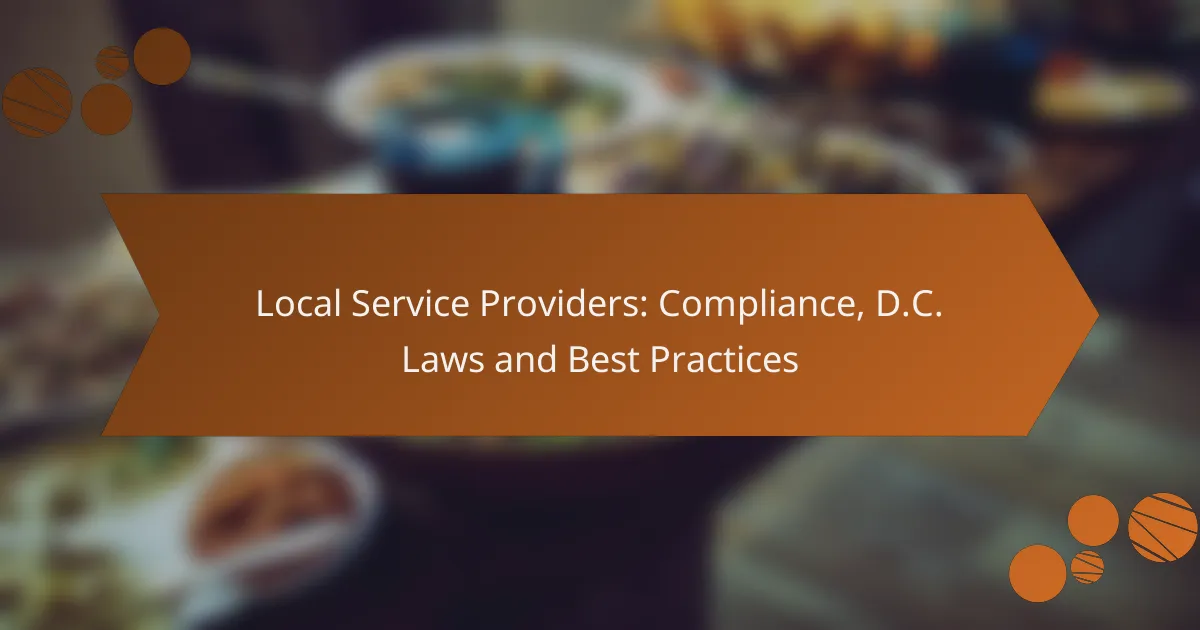Local service providers in Washington, D.C. face a complex landscape of compliance requirements, including business licensing, health and safety regulations, and labor laws. To operate effectively and legally, it is crucial for these providers to implement structured processes, such as regular training and consulting legal experts. By adhering to best practices, they can enhance service quality and foster strong customer relationships while minimizing the risk of legal violations.
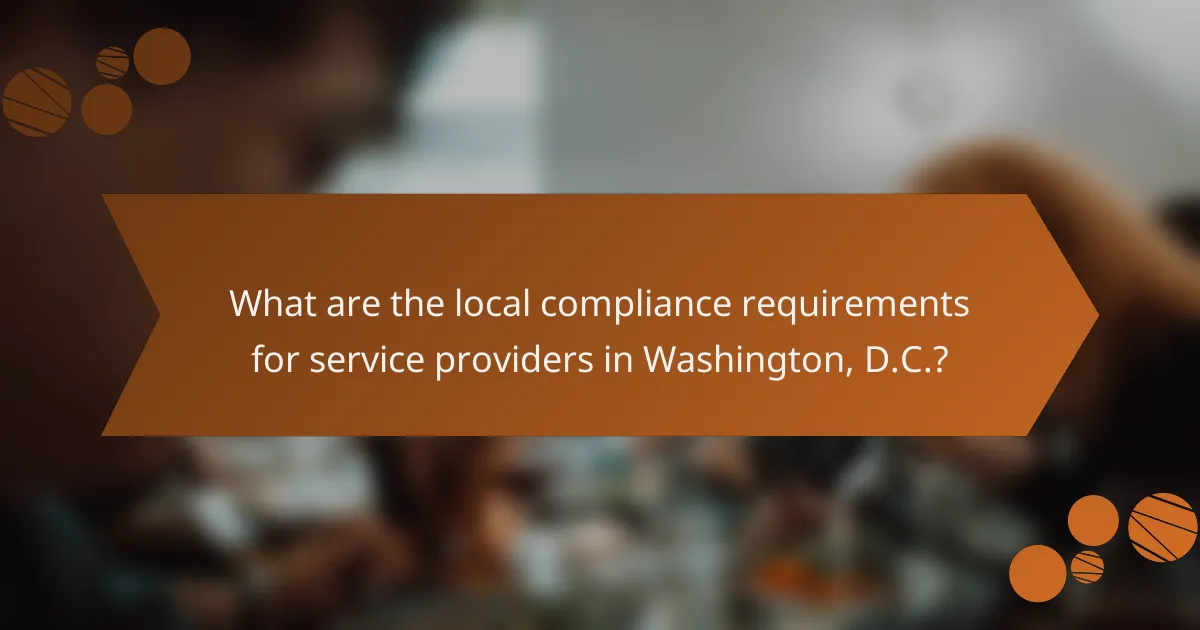
What are the local compliance requirements for service providers in Washington, D.C.?
Service providers in Washington, D.C. must adhere to various compliance requirements that encompass business licensing, health and safety regulations, insurance, tax obligations, and labor laws. Understanding these requirements is essential for operating legally and effectively within the district.
Business licensing
All service providers in Washington, D.C. are required to obtain a business license specific to their industry. The Department of Consumer and Regulatory Affairs (DCRA) oversees the licensing process, which may involve submitting an application, paying a fee, and meeting specific operational criteria.
Licenses can vary significantly based on the type of service offered, so it’s crucial to research the exact requirements for your business category. For example, a contractor may need a different license than a food service provider.
Health and safety regulations
Health and safety regulations in D.C. are enforced to ensure the well-being of both employees and customers. Service providers must comply with local health codes, which may include regular inspections and adherence to sanitation standards.
For instance, restaurants must follow food safety regulations set by the D.C. Department of Health, including proper food handling and storage practices. Non-compliance can lead to fines or closure.
Insurance requirements
Service providers in Washington, D.C. are generally required to carry specific types of insurance, including general liability and workers’ compensation. These insurance policies protect businesses from potential lawsuits and provide coverage for employee injuries.
The amount of coverage needed can vary based on the size and nature of the business. It’s advisable to consult with an insurance professional to ensure compliance with local laws and adequate protection.
Tax obligations
Businesses operating in D.C. must register for various taxes, including sales tax, income tax, and potentially others depending on the services offered. The Office of Tax and Revenue (OTR) manages tax collection and compliance.
Service providers should keep accurate records of their income and expenses to facilitate tax reporting and payment. Failure to comply with tax obligations can result in penalties and interest on unpaid amounts.
Labor laws
Labor laws in Washington, D.C. govern employee rights, wages, and working conditions. Service providers must comply with minimum wage laws, which are often higher than the federal standard, and ensure that employees receive proper benefits.
Additionally, businesses should be aware of regulations regarding overtime pay, sick leave, and workplace safety. Regularly reviewing labor laws is essential to avoid legal issues and maintain a fair working environment.
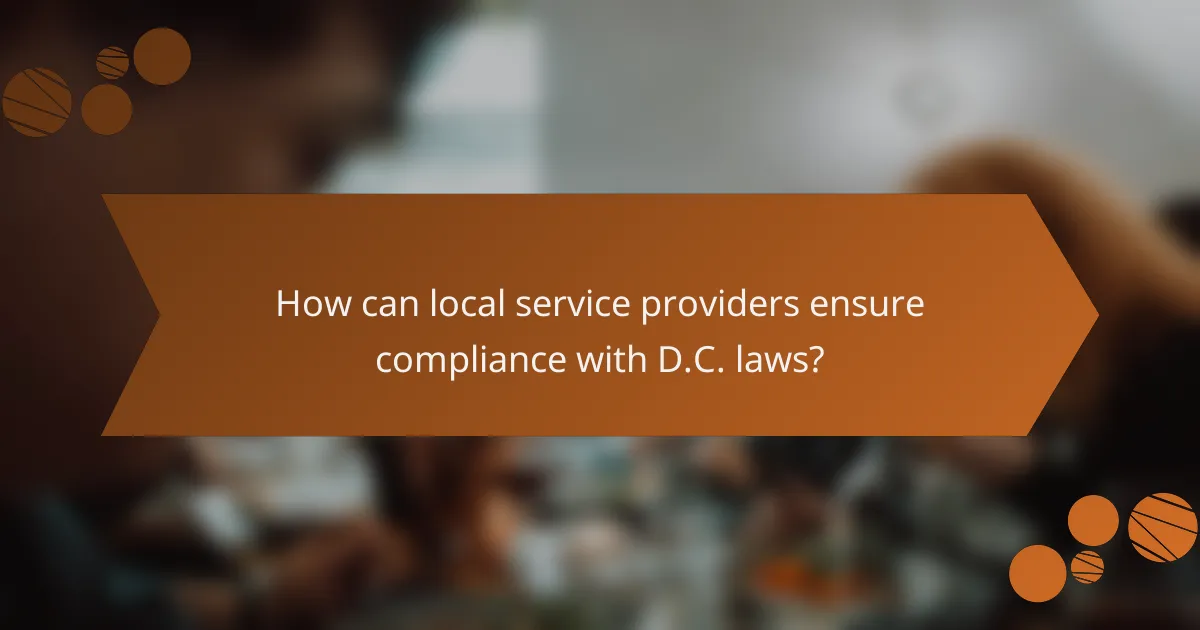
How can local service providers ensure compliance with D.C. laws?
Local service providers can ensure compliance with D.C. laws by implementing structured processes that include regular training, consulting legal experts, and utilizing compliance software. These strategies help businesses stay informed about legal requirements and minimize the risk of violations.
Regular training programs
Regular training programs are essential for keeping staff updated on D.C. laws and regulations. These programs should cover topics such as labor laws, safety standards, and consumer protection regulations. Providers should consider conducting training sessions at least quarterly to reinforce knowledge and address any changes in legislation.
Incorporating real-life scenarios and case studies can enhance the effectiveness of training. For example, role-playing exercises can help employees understand how to handle compliance-related issues in practice.
Consulting legal experts
Consulting legal experts is a critical step for local service providers aiming to navigate D.C. laws effectively. Engaging with attorneys who specialize in local regulations can provide insights into compliance requirements specific to the industry. This can help avoid costly mistakes and ensure that business practices align with legal standards.
Providers should consider establishing a relationship with a legal expert or firm that can offer ongoing advice and support. Regular check-ins can help identify potential compliance issues before they escalate.
Utilizing compliance software
Utilizing compliance software can streamline the process of adhering to D.C. laws. These tools often include features such as automated updates on regulatory changes, tracking compliance activities, and managing documentation. By leveraging technology, service providers can reduce manual errors and improve efficiency.
When selecting compliance software, providers should look for solutions that are user-friendly and customizable to their specific needs. It’s also beneficial to choose software that integrates with existing systems to minimize disruption during implementation.
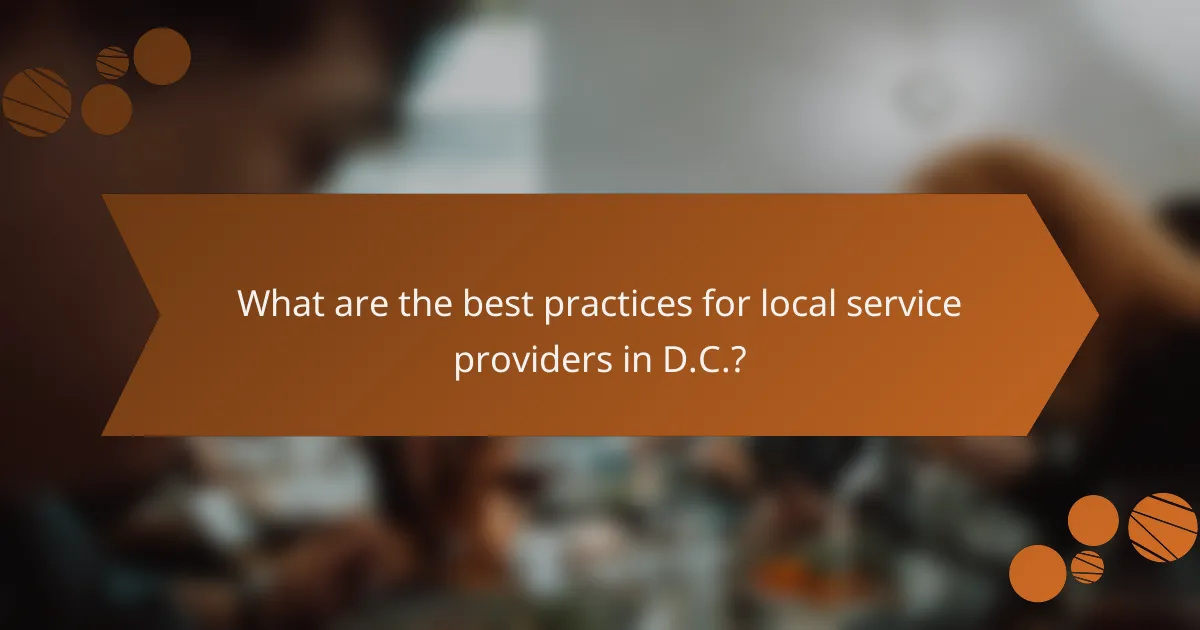
What are the best practices for local service providers in D.C.?
Best practices for local service providers in D.C. focus on compliance with regulations, maintaining quality service, and fostering customer relationships. By implementing effective strategies, providers can enhance their operations and ensure they meet local laws.
Maintaining accurate records
Accurate record-keeping is essential for local service providers in D.C. It helps ensure compliance with local regulations and provides a clear history of transactions and interactions. Providers should maintain records of customer information, service agreements, and financial transactions.
Utilizing digital tools can streamline this process. Consider adopting software that allows for easy updates and access to records. Regularly review and back up these records to prevent data loss and ensure they are up-to-date.
Implementing customer feedback systems
Establishing a customer feedback system is crucial for understanding client needs and improving service quality. Local service providers should actively solicit feedback through surveys, follow-up calls, or online reviews. This information can guide service enhancements and address any issues promptly.
Make it easy for customers to provide feedback by using simple forms or digital platforms. Regularly analyze the feedback to identify trends and areas for improvement, ensuring that customer voices are heard and valued.
Conducting regular audits
Regular audits help local service providers in D.C. assess their compliance with regulations and internal policies. These audits can identify gaps in service delivery, financial discrepancies, or areas needing improvement. Schedule audits at least annually or more frequently if needed.
During audits, review financial records, customer interactions, and service quality metrics. Consider involving an external auditor for an unbiased perspective. Use the findings to create action plans that address any identified issues and improve overall service effectiveness.
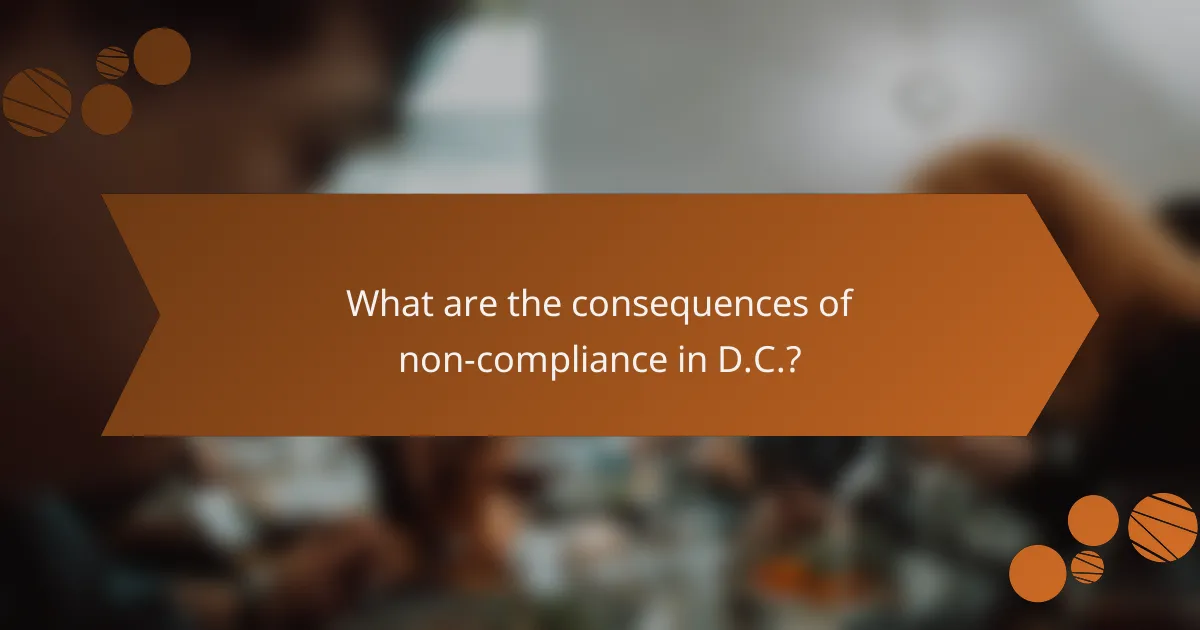
What are the consequences of non-compliance in D.C.?
Non-compliance with D.C. laws can lead to significant repercussions for local service providers, including financial penalties, loss of licenses, and potential legal actions. Understanding these consequences is crucial for maintaining operational integrity and avoiding disruptions.
Fines and penalties
In D.C., non-compliance can result in fines that vary depending on the severity of the violation. Minor infractions may incur fines in the low hundreds of dollars, while more serious breaches can lead to penalties in the thousands. It’s essential for service providers to stay informed about specific regulations to avoid unexpected costs.
Additionally, repeated violations can lead to escalating fines, which can significantly impact a business’s financial health. Keeping accurate records and ensuring compliance can help mitigate these risks.
License revocation
Failure to adhere to D.C. regulations can result in the revocation of business licenses. This action can halt operations and lead to substantial financial losses. The process typically involves a review by regulatory bodies, which may consider the nature and frequency of violations.
To prevent license issues, service providers should regularly review compliance requirements and engage in training for staff. Proactive measures can help maintain good standing with local authorities.
Legal action
Non-compliance can expose service providers to legal action from both regulatory agencies and affected parties. This may include lawsuits for damages or injunctions to cease operations. Legal proceedings can be costly and time-consuming, diverting resources from core business activities.
To minimize legal risks, businesses should implement compliance programs and consult with legal experts to navigate complex regulations. Regular audits can also help identify potential issues before they escalate into legal challenges.
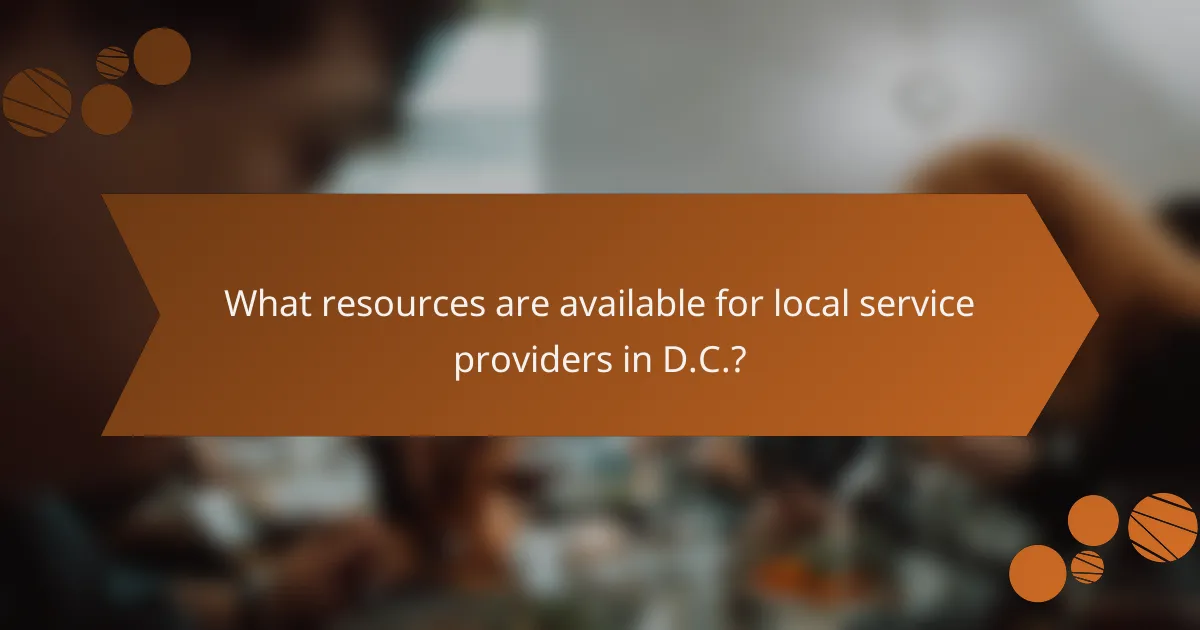
What resources are available for local service providers in D.C.?
Local service providers in D.C. can access a variety of resources to ensure compliance with local laws and best practices. These resources include government websites, industry associations, and training programs tailored to the unique regulatory environment of the District.
Government Websites
D.C. government websites serve as essential resources for local service providers. They offer information on licensing requirements, regulatory updates, and compliance guidelines specific to various industries. For example, the Department of Consumer and Regulatory Affairs (DCRA) provides detailed instructions on obtaining necessary permits and licenses.
Additionally, the D.C. Office of the Attorney General provides resources related to consumer protection laws that service providers must adhere to. Regularly checking these websites can help businesses stay informed about changes in regulations and compliance requirements.
Industry Associations
Joining industry associations can provide local service providers with valuable networking opportunities and access to best practices. Organizations like the D.C. Chamber of Commerce offer resources, training, and advocacy for businesses operating in the District. These associations often host workshops and seminars that cover compliance topics relevant to local laws.
Membership in such associations can also lead to discounts on services and products that assist with compliance, such as legal consultations or training programs. Engaging with peers in the industry can enhance understanding of common challenges and solutions.
Training Programs
Training programs are crucial for local service providers to understand compliance requirements thoroughly. Various organizations, including community colleges and professional training centers in D.C., offer courses focused on regulatory compliance, business ethics, and industry-specific standards.
Providers should consider enrolling in these programs to ensure their staff is well-versed in compliance issues. Regular training not only helps in adhering to laws but also fosters a culture of accountability and professionalism within the organization.
